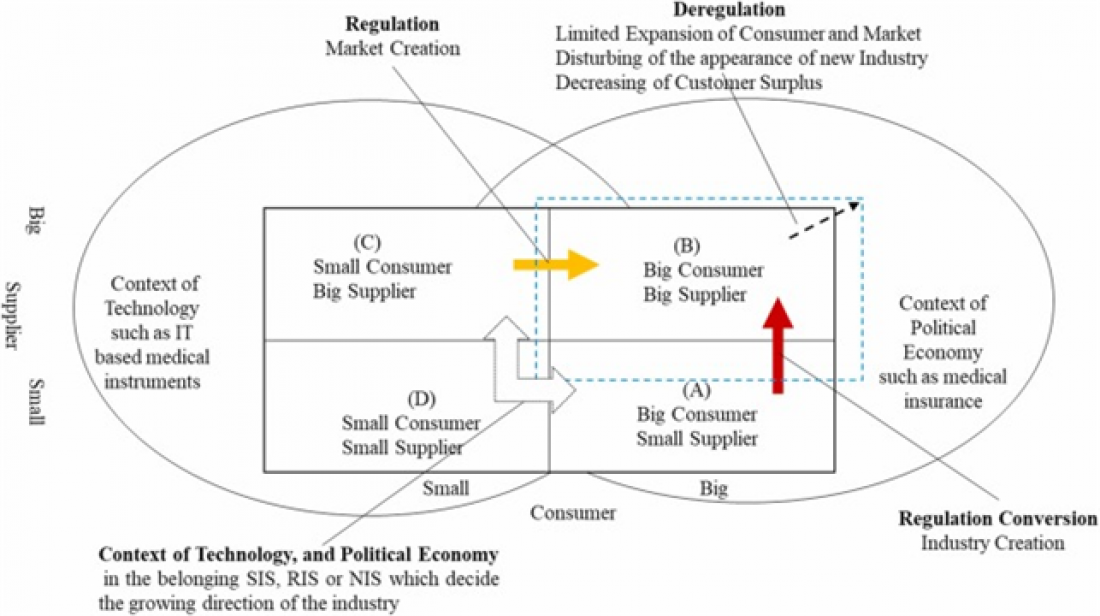□ Principal Researcher Jinhyo Yoon of the Electronics and Information Systems Research Department at DGIST (President Kunwoo Lee) conducted an in-depth study of telemedicine and for-profit hospitals in Korea and in the UK in collaboration with the research team of University of Greenwich in the UK. On the 1st (Mon), the research team announced that through empirical analysis, they identified the future directions for effective government policies, both in Korea and in the UK, for the “transformative new industries,” which refers to the industries that have transformed from traditional IT-based industries, and the “completely new industries” that did not exist before.
□ Schumpeter’s evolutionary economics theory is based on the idea that the economy constantly develops through innovation and creative destruction. In particular, with the concept of “creative destruction,” which is the keyword for the creation of new industries, it claims that creative new industries inevitably appear in the process of new industries developing and growing.
□ Meanwhile, over the past decade, Principal Researcher Yoon’s team (Senior Researcher Hyobi Cho and others) has built the global network for researchers around the world and studied “open innovation” in various industries across multiple countries. The concept of open innovation means that businesses and organizations create innovation by actively utilizing external knowledge, technologies, and resources and collaborating with others.
□ Principal Researcher Yoon’s research, based on Schumpeter’s theory, identified that “transforming regulations,” which apply the concept of open innovation for the transformation of existing industries, and “setting up regulations” that build the foundation for completely new industries are the key future directions for government policies to encourage the development of new industries. For the study, the research team analyzed the telemedicine and for-profit hospital industries in Korea and the UK.
□ The study findings show that in the field of transformative new industries, which had transformed from traditional industries (the telemedicine industry in the UK that had transformed from the home health care industry), transforming regulations is the growth engine for the creation of new industries. The study concluded that for such a case, transformative new industries grow, and related consumer surpluses are sufficiently created, when the government regulations focusing on the existing industries are drastically and boldly arranged and modified to accommodate the new industries born out of the transformation of traditional industries.
□ However, the study also discovered that for the completely new industries, thoroughly “setting up regulations” that are specifically structured to create sufficient consumer surpluses and prevent predictable risks is the growth engine for the creation of new industries. In other words, setting up regulations to protect consumers and reduce uncertainties faced by producers, which is essential to the growth of new industries, provides the momentum for the growth and development of completely new industries.
□ Furthermore, the study analyzed that deregulation is required to further expand the restricted market for the industries that are already in the maturity stage. The research team expected that deregulation would contribute to additionally expanding the market for the industries for which the market is already in the maturity stage and has enough tools to avoid consumer surpluses or producer risks within the market.
□ Open innovation, combined with digital transformation, has been increasing “transformative industries” exponentially across all industry fields. Creating such transformative new industries, it contributes to nurture new industries that could create sufficient consumer surpluses and generate labor and capital incomes. The study also revealed that coordinating regulations for the existing industries in a reflective manner is required to meet the needs of the new industries.
□ This study has been published in “Journal of Open Innovation: Technology, Market, and Complexity (JOIn),” which is rated among the world’s top journals in the open innovation and business model field and published by Elsevier, one of the largest journal publishers in the world, in March 2024.
- Ccorresponding Author E-mail Address : [email protected]



